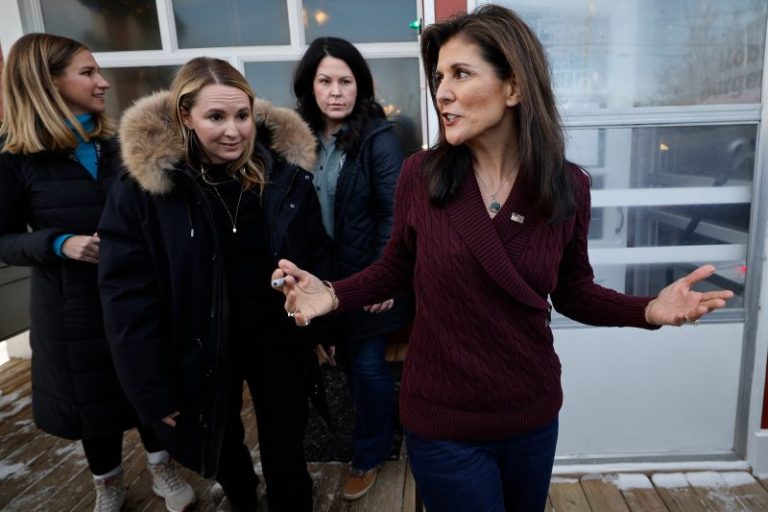At a debate last week, Nikki Haley and Ron DeSantis effectively took turns calling each other liars for two hours. It was a striking scene — not just because of the vitriol, but because of the man who was spared.
Donald Trump, after all, was the candidate the two of them were ostensibly trying to defeat. Donald Trump, after all, spent his four years in the White House uttering more than 30,000 false and misleading claims. The argument was and has been right there, but nobody has cared — or more aptly, dared — to make it. They instead focused on calling each other liars in hopes of becoming the Republican Party’s emergency backup plan.
That’s begun to change somewhat. Haley is increasingly leaning in on calling Trump a liar. But she’s still not fully committing to the bit. And it’s still about three years after it truly had a chance to affect the 2024 race.
Haley, in a Fox News interview Friday morning, said that both Trump and President Biden were “lying to the American people” and twice more referred to Trump’s lying. She added that we need to “stop taking what he’s saying as golden.”
She later added in a tweet, “Another reason we need to move on from Trump: too many lies.”
Another reason we need to move on from Trump: too many lies.
Democrats can’t vote in the NH primary. They haven’t been able to change their registration for months.
I was tougher on China and Russia than Trump ever was. He praised Xi a dozen times after China gave the world… pic.twitter.com/3EAdpMHwt5
— Nikki Haley (@NikkiHaley) January 19, 2024
It’s worth noting that the subject matter of these alleged lies is limited. It’s not necessarily that Trump is an inveterate liar about lots of things; it’s that he’s lying specifically about things pertaining to Haley and her record. This is easier for voters to shrug off as standard campaign politics. Everyone accuses everyone of lying about them — as they did in last week’s debate — and many voters will believe all’s fair in love and war.
But the bigger issue is that the die has been cast on this, and a few days before the New Hampshire primary is late in the game to press this issue.
As Haley herself demonstrates. There was a remarkable scene in Tim Alberta’s must-read February 2021 profile of Haley. You might remember this as the piece in which Haley seemed to signal a real break from Trump after Jan. 6 — shortly before reversing herself.
But in an interview in the run-up to Jan. 6, Haley wouldn’t say that Trump was lying. In fact, she indicated that Trump truly believed the bogus, wild things he said about voter fraud in the 2020 campaign:
This, in a few paragraphs, encapsulates the GOP’s handling of Trump’s relationship with the truth. Not only wouldn’t Haley say Trump was lying; she strained to even allow that the demonstrably false things he was saying were irresponsible.
I wrote early in Trump’s presidency about the “stupid or liar” construct — how, even if Trump somehow believed the things he was saying, the fact that he didn’t know better seemed to be a pretty bad thing. But Haley didn’t even want to allow that Trump qualified for the latter.
And Haley wasn’t alone. DeSantis spent many months after the 2020 election punting when asked whether Biden’s win was legitimate. This was the GOP’s M.O. at the time. Best not to inflame Trump and his supporters, and just hope he goes away.
The problem is that he didn’t go away, and this approach has allowed Trump’s version of the truth to live on — in ways that have effectively foreclosed Haley’s and DeSantis’s shot at taking him down.
This week’s Iowa caucuses were a case in point. Nearly two-thirds of voters said they believed Trump’s false claim that Biden wasn’t legitimately elected — a number that reflected where the Republican Party has been for basically all of the past three years. And the festering belief that Trump didn’t actually lose has created a more practical problem: It undermined what might have been Haley’s and DeSantis’s best argument in the 2024 race, that they would have a better shot at winning. (DeSantis was coming off a decisive reelection victory, and Haley polls better than Trump in the general election.)
The party’s refusal to fault Trump’s pre-Jan. 6 claims and actions has also spawned a cottage industry of Jan. 6 revisionism that has allowed Trump to remain the domineering figure in the party.
Beyond that, we’re way past the point at which Republican voters are truly going to be convinced that what Trump is telling them isn’t true. A Quinnipiac University poll last month showed 69 percent of Republicans said Trump is honest. A poll last summer showed more Trump voters trust him to tell them the truth than say the same of their own friends and family, conservative media or even religious leaders.
Trump’s Republican opponents have occasionally been willing to call out Trump for lying when it involves them. But their steadfast refusal to do it when it mattered more for the party is probably what has cost them the most.

